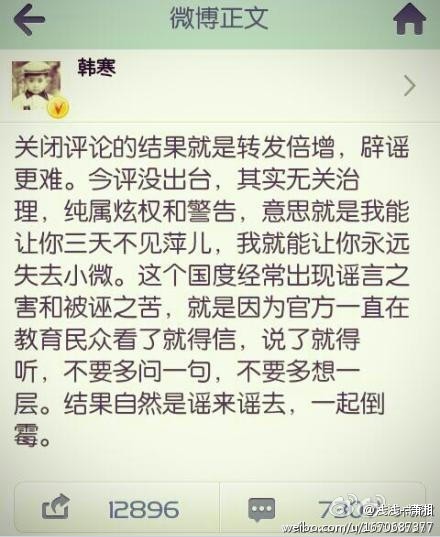Crackdown on Microbloggers in China
As more people have started using microblogging sites, China has struggled to implement the same level of control that they have imposed on the web. On March 30 China took steps to intensify their scrutiny of microblogging sites, shutting down 16 sites and detaining six people for spreading rumors of an attempted coup in Beijing. Additionally, at China’s direction, the two largest microblogging services in China, Sina Weibo (Weibo.com) and Tencent Weibo (t.qq.com) suspended their comment functions for three days in order to “clean up rumors and other illegal information.”
The recent crackdown followed heated online speculation about the forced departure of Chongqing party secretary Bo Xilai. This led to claims of a coup in Beijing. The State Internet Information Office cited the spreading of “fabricated” information in Friday’s punishments. The People’s Daily, official newspaper of the Communist party, commented:
By falsely packaging lies and speculation as “truth” and “existence,” online rumours undermine the morale of the public, and, if out of control, they will seriously disturb the public order and affect social stability.
China has become increasingly wary of social media services, which have become difficult to control. The government-imposed restrictions on Sina and Tencent weibo (“little blogs”) are the most overt in some time. Prior to the crackdown, Chinese Internet companies were already required to monitor and remove “harmful” content from their sites—“a process Internet users jokingly call ‘harmonizing,’ in reference to government campaigns for a more harmonious society.” While hundreds are employed by such companies to censor content, effective filtering is difficult due to the speed at which content is added and the use of code words and nicknames.
With the temporary restriction of their popular commenting feature, Sina and Tencent have received the message loud and clear—they must tighten their grip to avoid further punishment or shutdown. Their users, however, were vocal in their disapproval of the comment feature’s outage. The sites still allowed original posts, and according to Sina statistics reported by the Wall Street Journal, “the number of posts on Sina Weibo related to the term ‘comment’ skyrocketed to 115,758 at midmorning on Tuesday, up from roughly 22,000 on Friday.” Investors were not happy either, with Sina’s stock falling 10% last week.
Popular Chinese author Han Han posted the following microblog last Tuesday morning (which has since been deleted, but not before being forwarded to tens of thousands of followers):
By taking away comments for three days, the government is showing that you can lose your micro-blogs forever. If people in this country often fall victim to rumors, that’s because our officials educate us to believe everything we see, listen to all we hear, and not ask for anything more or think about things on another level. The result is that we are all susceptible to rumor-spreading.
The Atlantic has saved and posted a screenshot of the post (which has disappeared from Chinese sites after much circulation):
Going forward, Forbes predicts that weibo companies “will undoubtedly delete any political postings on their services that are even remotely political for fear of offending Beijing, which could easily anger many of their millions of users who will no longer be able to post many of their thoughts online.” China has already expanded the requirement of real-name registration for microblog users; increased censorship will likely be the next step.
Despite such censorship, microblogs remain quite successful in China—with about 250 million users—though it remains to be seen how vibrant and active such services will remain while under ever increasing scrutiny.
